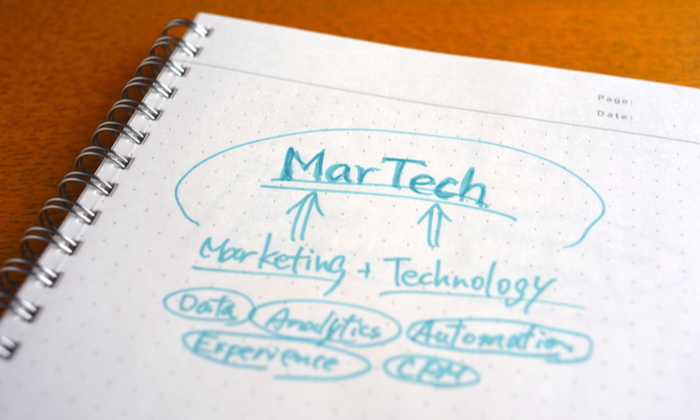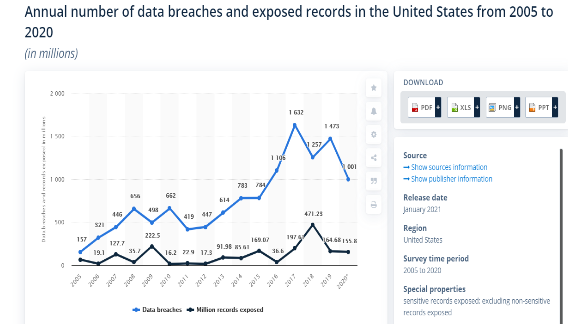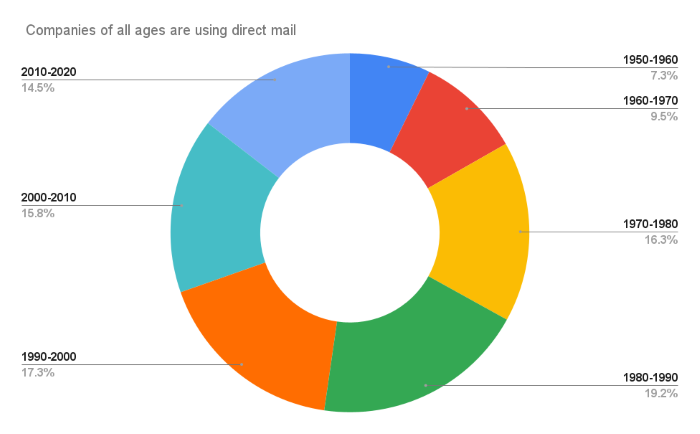
Are you hoping to identify MarTech trends that can help your campaigns be more effective and run more smoothly?
As our marketing capabilities evolve, so do the tools we use to measure our successes and how we achieve that success.
In this blog, we unpack the six biggest MarTech trends looming over the marketing industry and how you can use them to your advantage.
What Is MarTech?
Marketing technology, or MarTech, as it is more commonly known, refers to software and platforms that help individuals or organizations achieve marketing goals.
This term is very inclusive, covering everything from email templates to data analytics.
While every individual, agency, or company has unique MarTech needs, the constantly-growing field is making great leaps to fill any open niche.
Over the past twenty years, the field has seen truly exponential growth. Today, being a marketer doesn’t necessarily mean you have to be incredibly tech-savvy, but it does mean that you need to understand the benefits of tools that can improve your strategy and help you reach your goals.
Your competitors are likely using MarTech to help their campaigns succeed. If you’re not looking toward how you can automate, optimize, and ideate your campaigns through MarTech, it’s time to start.
Examples of MarTech
As we mentioned above, MarTech is a very wide umbrella. However, some forms of MarTech are more common than others. These include:
Email Marketing
With more than 50 percent of survey respondents copping to checking their email in excess of ten times a day, it’s no wonder that email marketing is an easy way to try to reach your target audience. While the operative word in that sentence was try, marketing automation tools can get you that much closer to your goals.
To reach them, you need tools and platforms that not only disseminate your emails but provide in-depth analytics that gives you a real-time view of reader practices and interactions. As email marketing continues to grow and evolve, the demand for personalization in this medium will also continue to grow.
Marketers should use automation and AI to deploy targeted emails engineered to attract a particular audience segment. To achieve successful personalization, use data to assess customer habits and preferences for each audience segment and then craft corresponding templates. Then your MarTech tool can do the rest.
Content Management
While managing your website content used to be a time-consuming, exhaustive process that took hours of coding, new marketing technology has automated cumbersome processes, allowing marketers to dedicate time to other important pursuits.
Content management systems (CMS) have evolved over the years, now equipped with the capabilities to develop the following kinds of websites (along with many others):
- social networking
- blogging platform
- static website
- news
- online store
Predicted to achieve a compound annual growth rate (CAGR) of 16.7 percent, as CMS capabilities grow, so will collaboration and planning tools that unite workflows to allow complete management of content from creative to back-end development.
Data Analytics
Today, marketers can harness the power of data analytics to gain an understanding of customer preferences and behaviors—including how they shop, where they spend their time, and how they discover new offerings—as well as market trends.
MarTech tools that allow marketers to dive deep into these data sets are invaluable, as they provide never-before-seen maps of how consumers operate online. By tracking online behaviors, marketers gain a deeper understanding of their customers.
As MarTech data tools become even more intuitive, marketers will have even more visibility of customer journeys, following them from initial interest to final purchase. These insights will be captured through cookies and CTR, among other trackers. As the tools become more refined, so will understanding of consumer behavior, allowing marketers to readjust their strategies.
6 MarTech Trends
To help you decide which MarTech offerings you want to add to your stack, we broke down the six biggest trends that are likely to impact both the MarTech world and the marketing world well beyond this year.
1. Increased Spending on Analytics
If you’re tempted to bypass adding an intuitive analytics tool to your MarTech stack, don’t. These tools can help you gain a better understanding of nearly every aspect of your marketing campaigns, from buyer behaviors to conversion rates.
In fact, researchers expect marketing analytics budgets to grow by 61 percent over the next three years.
That’s huge. You don’t want to miss out on getting in early on a tool that can quite literally change the way you see your business.
Some of the many benefits of marketing analytics tools include:
- viewing real-time, comprehensive outcomes of marketing efforts across channels
- improving lead generation through actionable insights
- gaining insights into customer behavior and preferences
- using predictive analytics to enable your business to be proactive rather than reactive
2. Higher Emphasis on Personalization
We nodded a bit toward the importance and growing prevalence of personalization in marketing campaigns.
In short, this strategy means delivering individualized content to audience members. This personalized route builds a connection with consumers, treating them as individuals rather than a mass market.
Some common (and growing) opportunities for personalization include:
- targeted emails
- custom video messages
- product recommendations
- social media
In the coming years, this prevalence will only grow, and marketers who don’t use tools to aid them in personalization will fall behind.
In fact, 99 percent of marketers claim personalization helps advance customer relationships, and 44 percent of consumers say they would be willing to switch to a brand that better personalized its marketing material.
If you’re not taking advantage of learning more about your would-be customers through tools and data, you’re missing out—not only on reaching customers more strategically but also on building relationships.
3. Transition Away From Third-Party Cookies
If you’re an advertiser or marketer who has relied heavily on third-party cookies, you may be in for a bit of a shock.
In 2020, Google announced its plan to phase out third-party cookies within two years. With Google Chrome composing almost 65 percent of the web browsing market according to statcounter’s data below, this move will have a dramatic impact on how marketers gather data.

If in the past, you relied on information from cookies to gain an understanding of consumer behavior and identity, you’re going to need to recalibrate your strategy.
Recently, Adobe found two in five brands are not prepared to transition away from cookies, indicating businesses do not have a strategy for gathering consumer data post-cookie.
After the transition is final, marketers will no longer be able to capture individual consumer data. To prepare for this future, digital marketers must align with the trend of personalization to reach and understand their intended consumers.
4. Higher Need for Data Privacy and Security
If you’ve been keeping an eye on the news, you know that data breaches are on the rise. The United States alone has seen data breaches grow from 660 annually to over a thousand within the past decade, according to Statista.
If you think this number doesn’t apply to you, think again. Your website and consumer data are among your business’ most valuable assets. You need to protect them from malicious attacks at all costs.

5. Increased Importance of Campaign Automation Tools
Marketing automation can make every aspect of your marketing campaign easy. By using these tools, you reduce time spent, error, and unnecessary cost.
We’re not the only ones who think this way: The marketing automation market is primed to grow 8.55 percent annually, with 51 percent of companies already taking advantage of these tools.
- Time-saving: With tools that automate time-consuming processes like project management, all members of your team will rejoice in the sheer amount of time they can reclaim after implementing these tools.
- More effective spend: By pinpointing processes that devour valuable time and treating them with automation software, you can use your budget much more effectively, saving both time and money.
- Scalability: MarTech automation tools scale with you. If you’ve got a big vision for your organization, these tools fit your business needs for today and tomorrow.
- Concrete measures of success: We’ve talked about the importance of data and metrics a lot in this article. All MarTech automation tools come with data insights that allow you to track everything from productivity to campaign spend.
As you assess your organization’s needs, look at how marketing automation tools simplify your processes and streamline campaign creation. The benefits of marketing analytics tools include:
6. Growing Importance of Direct Mail
Thought direct mail was dead? Think again: Forty-two percent of direct mail recipients engage with your send either through reading or scanning.
Further, 73 percent of Americans prefer direct mail marketing, as it allows them to read the piece at their leisure rather than forcing immediate consumption.
This year and beyond, you should reassess your organization’s direct mail strategy to see if there are new (or overlooked) avenues for you to contact your prospects directly through their physical mailbox, according to Who’s Mailing What:

Outside of the above statistics, benefits of direct mail include:
- opportunities for personalization
- builds familiarity and trust
- easy to track
- complements your digital campaign
- cost-effective
MarTech Frequently Asked Questions
What Is MarTech?
Is MarTech a Good Investment for My Business?
What MarTech Trends Will Dominate the Market?
While there is a slew of MarTech trends that reshape the market year after year, we can confidently report that these six trends will be game-changers in the MarTech world:
- increased spending on analytics
- higher emphasis on personalization
- transition away from third-party cookies
- increased need for data privacy and security
- increased importance of campaign automation tools
- growing importance of direct mail
Is Direct Mail Still a Good Marketing Strategy?
In a word, yes. Direct mail is still an extremely effective marketing strategy. While there’s a lot of conversation around digital marketing, this classic mode of reaching potential customers is as effective as ever.
Want proof? Forty-two percent of direct mail recipients actually read what you’re sending them. Compare that to your average email clickthrough rate (CTR), and you’ll understand the true, measurable value of direct mail.
MarTech 2021 Trends: Conclusion
As marketing needs and customer predilections continue to change, so will the tools we use to meet them.
However, the six marketing trends outlined in this post are here to stay.
To help your organization grow with these MarTech trends, be sure to invest in software that can help you achieve all of your marketing goals. Tools are meant to be used—be sure you’re taking advantage of them to outmaneuver your competitors.
What’s your prediction for the biggest marketing trend in 2021 and beyond?
from Blog – Neil Patel https://ift.tt/3yIKmh1

No comments:
Post a Comment